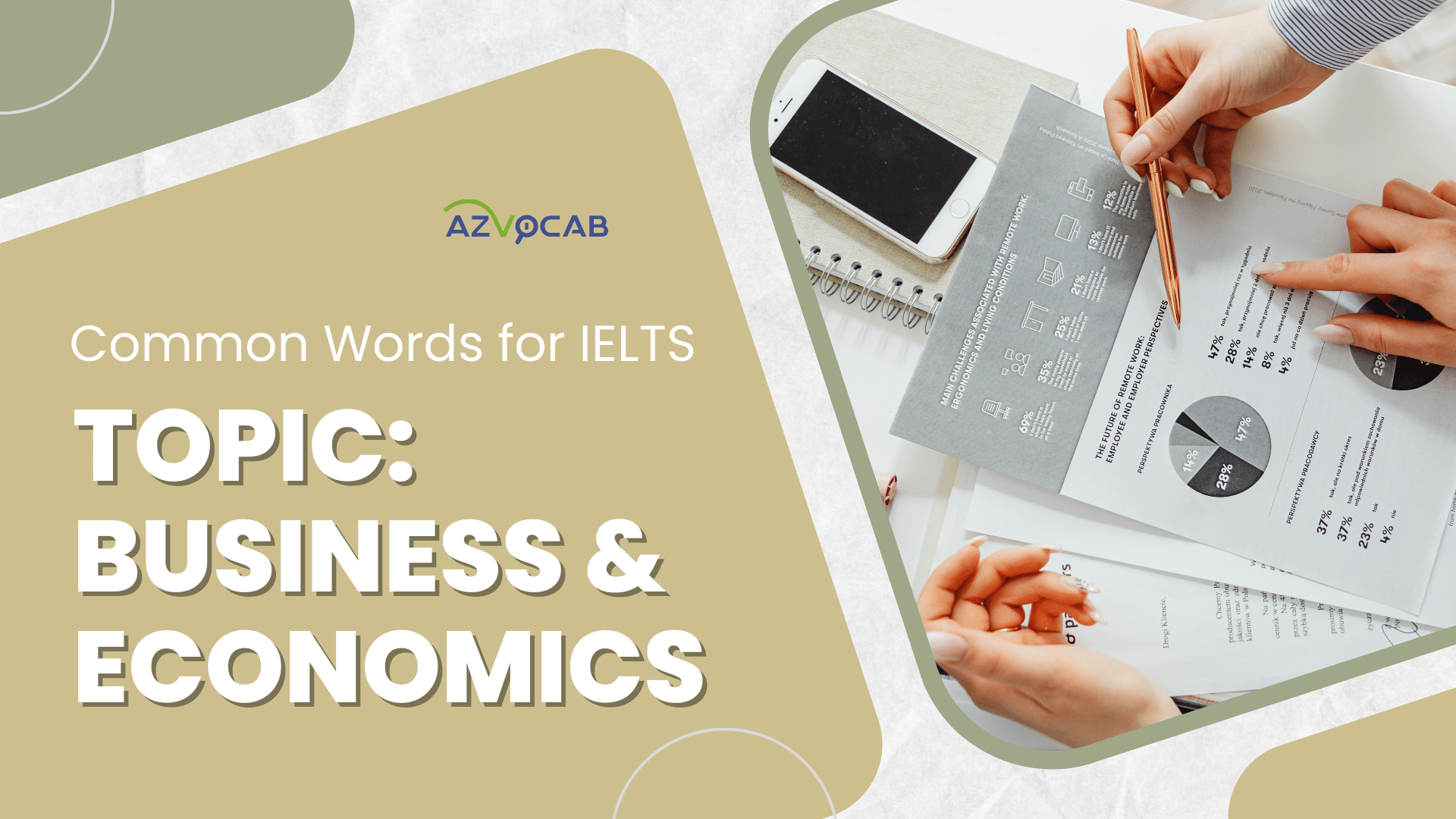70+ Common Words of the Topic Business and Economics for the IELTS exam
30 August, 2023Common words for IELTS

azVocab has compiled over 70 common words on the topic of “Business and Economics” for the IELTS exam. These vocabulary words can be used in all four sections of four skills: Reading, Listening, Speaking, and Writing. azVocab has carefully selected examples that fit specific contexts in IELTS exams. This will help you understand how to use these words in context, increasing the effectiveness of your vocabulary learning.
1. Vocabulary related to economic and business terms
| sales representative (n.) – someone whose job is to sell a company’s products, often by traveling to different places | After the prospect has turned into a customer, the business card provides information for the customer to contact the sales representative to place further orders. |
| vendor (n.) – a person or company that sells goods or services | Our company deals with many vendors of women’s clothing. |
| managerial (adj.) – relating to a manager or management | Long-term employees are more likely to be promoted to a managerial position within a company. |
| bottom line (n.) – the final line in the accounts of a company or organization, stating the total profit or loss that has been made | How will the rise in interest rates affect our bottom line? |
| consumer (n.) – a person who buys goods or services for their own use | The widespread awareness of the low-carb phenomenon has led many consumers to check food labels while trying to lose weight. |
| customer (n.) – a person who buys goods or a service | The market demographics for tattoo services are now skewed heavily toward mainstream customers. |
| economics (n.) – the way in which trade, industry, or money is organized, or the study of this | The problem isn’t only a matter of economics. There’s also technology to consider. |
| formulation (n.) – the action of developing all the details of a plan for doing something, or something that is developed in this way | She is responsible for the formulation and implementation of marketing strategies. |
| household name (n.) – a famous person that most people know of | Running a company this size is never an easy task, and it’s only through sheer hard work and determination we’ve become the household name we are today. |
| luxury goods (n.) – expensive things, such as jewellery and make-up, that are pleasant to have but are not necessary | The government will pay for the new schools by increasing the tax on luxury goods. |
| dissatisfied (adj.) – not pleased with something; feeling that something is not as good as it should be | With social networking, it’s very easy for one dissatisfied customer to post on his or her blog that the company messed up. |
| disturbing (adj.) – making you feel worried or upset | A disturbing trend for insurers has been a rise in fraudulent claims. |
| economic (adj.) – relating to trade, industry, or money | At home, parents can teach children how to stick to a budget. If a country experiences an economic crisis, these skills are invaluable. |
| economical (adj.) – not using a lot of fuel, money, etc. | Taking a packed lunch to work can be a lot more economical than buying it every day. |
| fruitless (adj.) – f an action or attempt to do something is fruitless, it is unsuccessful or produces nothing of value | All diplomatic attempts at a peaceful solution to the crisis have been fruitless. |
| hands-on (adj.) – someone with a hands-on way of doing things becomes closely involved in managing and organizing things and in making decisions | I employ over 2.000 staff, but I take a hands-on approach to management and so I keep track of how things are going in just about every department. |
| inevitable (adj.) – certain to happen and unable to be avoided or prevented | The failure of a small business is not inevitable if all the important pieces are in place. |
| monetary (adj.) – relating to the money in a country | As insurance became a profitable business, companies soon realized the monetary benefits of hiring men to extinguish fires. |
| persuasive (adj.) – making you want to do or believe a particular thing | In the eighteenth century, in colonial America, advertisements were most frequently announcements of available goods. but even in this early period, persuasive appeals accompanied dry descriptions. |
| profitable (adj.) – making or likely to make a profit | Many credit card issuers, for example, choose not to deny a transaction that would put the cardholder over his or her credit limit; it’s more profitable to let the customer overspend and then impose penalties. |
| short-sighted (adj.) – a short-sighted person can only clearly see objects that are close to them | The management agreed to employ five more members of staff, which in hindsight was a very short-sighted decision because within a few weeks, we were still understaffed. |
| tremendous (adj.) – very great in amount or level, or extremely good | An economic crisis may have tremendous consequences for our global security. |
| ubiquitous (adj.) – seeming to be everywhere | In early modern Britain, one of the most characteristic forms of recycling has been the trade in second-hand clothing, which has survived to the present day in the shape of the ubiquitous charity shop. |
| unavoidable (adj.) – impossible to avoid | Recession at the time seemed unavoidable. |
| up-and-coming (adj.) – likely to achieve success soon or in the near future | Up-and-coming enterprises in the small and medium-sized business sector must be strongly incentivised. |
| adjust (v.) – to change something slightly, especially to make it more correct, effective, or suitable | Advertisements, as historian Roland Marchand pointed out, sought to adjust Americans to modern life, a life lived in a consumer society. |
| aggravate (v.) – to make a bad situation worse | The manufacture of polyester and other synthetic fabrics is an energy-intensive process requiring largo amounts of crude oil and releasing emissions which can cause or aggravate respiratory disease. |
| amalgamate (v.) – to join or unite to form a larger organization or group, or to make separate organizations do this | Because it is a risk, we decided to amalgamate with a Chinese company. |
| assure (v.) – to tell someone confidently that something is true, especially so that they do not worry | The unions assured the new owners of the workers’ loyalty to the company. |
| create (v.) – to make something new, or invent something | A company creates a diverse product and pricing portfolio to meet the price range and needs of different customer segments. |
| cultivate (v.) – to try to develop and improve something | In a recent study, SwindaJanda and collaborator Hong-Youl of South Korea’s Kangwon National University explored how businesses can cultivate and keep loyal customers and how relationships between businesses and customers are minor human relationships. |
| dominate (v.) – to have control over a place or person | Worldwide, the soft drinks market is totally dominated by just one or two big companies. |
| enhance (v.) – to improve the quality, amount, or strength of something | The study found that promotional events designed to counter customers’ negative attitudes can significantly enhance the customers’ likelihood of engaging in a long-term relationship with the business. |
| exploit (v.) – to use something in a way that helps you | Some companies consciously and cynically exploit their customers’ confusion in this way. |
| induce (v.) – to persuade someone to do something | If we can increase the benefits of co-operation or the costs of defection, we can induce people to act in the group interest because it is also in their self-interest. |
| inform (v.) – to tell someone about particular facts | Hotels, for example, often don’t reveal information about discounts and, along with car hire companies, fail to inform customers about possible upgrades. |
| invest (v.) – to put money, effort, time, etc. into something to make a profit or get an advantage | To solve these problems, governments can either focus on draconian punishments or improve employment opportunities, invest in good housing projects and tackle drug and alcohol abuse. |
| linger (v.) – to take a long time to leave or disappear | An understanding of customer psychology is an invaluable aid for retailers looking for ways to increase sales. Much can be done to the store environment to encourage shoppers to linger longer and spend more money. |
| mislead (v.) – to cause someone to believe something that is not true | The advertising campaign intentionally misled consumers about whether the product was natural. |
| mismanage (v.) – to organize or control something badly | The restaurant was hopelessly mismanaged by a former rock musician with no business experience. |
| oblige (v.) – to force someone to do something, or to make it necessary for someone to do something | Though the firemen were well paid, they were constantly on duty and thus obliged to call their fire station home for both themselves and their families. |
| tempt (v.) – to make someone want to have or do something, especially something that is unnecessary or wrong | New employees may be tempted to take in too much responsibility when they first join a firm. |
2. Vocabulary related to economic and business development
| bankruptcy (n.) – a situation in which a business or a person becomes bankrupt | The company was forced into bankruptcy. |
| budget (n.) – a plan to show how much money a person or organization will earn and how much they will need or be able to spend | Healthcare and education are both essential services that can be extremely expensive and as a result, unaffordable for those on a limited budget. |
| consistency (n.) – the quality of always behaving or performing in a similar way, or of always happening in a similar way | Brand loyalty is about the consistency with which consumers buy a certain brand. |
| credit rating (n.) – a calculation of someone’s ability to pay back money that they have borrowed | Filing for bankruptcy is arguably the most extreme signal of financial distress,’ said the researcher. Not only is it bad for creditors, but it also seriously harms a filer’s credit rating, affecting the availability and cost of future loans.’ |
| cutback (n.) – a reduction in something, made in order to save money | If things don’t improve soon, I’ll be forced to make cutbacks in that department. |
| distributor (n.) – a person or organization that supplies goods to shops and companies | For the past twenty years, they have been the country’s leading distributor of household appliances. |
| equity (n.) – the value of a company, divided into many equal parts owned by the shareholders, or one of the equal parts into which the value of a company is divided | The researchers found that mid-level lottery winners did not ill fact pay off their debt or increase equity in existing assets. |
| expense (n.) – the use of money, time, or effort | Nowadays many elderly people struggle to meet their everyday living expenses. |
| hurdle (n.) – a problem that you have to deal with before you can make progress | The enormous cost of this programme is a major hurdle that we need to overcome. |
| increase (n.) – a rise in the amount or size of something | The globalizers doubled their annual GDP over this period and there was also an increase in the GDP of the non-global countries, while the wealthy countries fell to three percent per year. |
| manufacturer (n.) – a company that produces goods in large numbers | The other company was looking for an exporter and we were looking for a local manufacturer, so a win-win situation, really. |
| money (n.) – coins or notes (= special pieces of paper) that are used to buy things, or an amount of these that a person has | As a student, I had barely any money, just enough for a few things l really needed. |
| online retailer (n.) – an organization that sells its products and services via a website on the Internet | In terms of online retailers, in order to enhance customer loyalty, they should focus on enhancing customer perceptions of their trustworthiness. |
| productivity (n.) – the rate at which a company or country makes goods, usually judged in connection with the number of people and the amount of materials necessary to produce the goods | So it is not surprising that farmers are turning to genetically modified crops to try to boost productivity. |
| rebate (n.) – an amount of money that is returned to you, especially by the government, for example when you have paid too much tax | Promotions that don’t focus on a hard-sell approach but rather on providing relevant information such as the availability of rebates for the customer. |
| retail (n.) – the activity of selling goods to the public, usually in shops | Tattooing today is the sixth fastest-growing retail business in the United States. |
| share (n.) – one of the equal parts that the ownership of a company is divided into, and that can be bought by members of the public | I would like to increase my income so I’m going to invest in some shares. |
| trade (n.) – the activity of buying and selling, or exchanging, goods and/or services between people or countries | When Europeans opened up the fur trade in North America in the 17th century, the French traders used larger canoes to transport furs in large quantities across the Great Lakes for shipment back to Europe. |
| bankrupt (adj.) – unable to pay what you owe, and having had control of your financial matters given, by a law court, to a person who sells your property to pay your debts | Despite a promising start, it looks like the company will soon be bankrupt. |
3. Vocabulary related to advertising and marketing
| advertisement (n.) – a picture, short film, song, etc. that tries to persuade people to buy a product or service | In the eighteenth century, in colonial America, advertisements were most frequently announcements of available goods, but even in this early period, persuasive appeals accompanied dry descriptions. |
| advertising (n.) – the business of trying to persuade people to buy products or services | Usually, advertising attempts to persuade its audience to purchase a product or a service. |
| billboard (n.) – a very large board on which advertisements are shown, especially at the side of a road | There are some really large billboards along the motorway as you come into town. |
| branding (n.) – the act of making a product, organization, person, or place easy to recognize as different from others by connecting it with a particular name, design, symbol, set of qualities, etc. | The branding of Western Wats as Opinionology resulted in the creation of the biggest market-research company in the world. |
| campaign (n.) – a planned group of especially political, business, or military activities that are intended to achieve a particular aim | I’ve recently been promoted and now I’m in charge of several advertising campaigns. |
| flyer (n.) – a small piece of paper with information on it about a product or event | There’s a street I walk down every day and the walls are plastered with flyers for new bands and events. |
| gimmick (n.) – something that is not serious or of real value that is used to attract people’s attention or interest temporarily, especially to make them buy something | They give away free gifts with children’s meals as a marketing gimmick. |
| jingle (n.) – a short simple tune, often with words, that is easy to remember and is used to advertise a product on the radio or television | On the radio, I heard this jingle for a new toothpaste and it’s one I’ve heard a lot and I couldn’t get the tune out of my head after that! |
| market (n.) – the business or trade in a particular product, including financial products | Large overseas companies have control over the non-alcoholic drink market. |
| marketing (n.) – a job that involves encouraging people to buy a product or service | Ong of the most influential propositions in marketing is that customer satisfaction means loyalty and loyalty means profits. |
| slogan (n.) – a short easily remembered phrase, especially one used to advertise an idea or a product | The goal of advertisers is to produce a slogan that people remember and use on a regular basis – promoting brand awareness well outside the original advertisement. |
| catchy (adj.) – (especially of a tune or song) pleasing and easy to remember | The common practice at that time was for copywriters to think up an appropriate and perhaps catchy text to attract the attention of the buying public. |
| telemarketing (n.) – the advertising or selling of goods or services by phone | When asked about attitudes towards different forms of advertising, consumers rated interruptive or intrusive formats such as telemarketing and spam email as most annoying. |
| irritating (adj.) – making you feel annoyed | A telephone call with an automated telemarketing message is equally irritating whether we classify it as advertising or sales effort. |
| promotional (adj.) – intended to advertise something | The study found that promotional events designed to counter customers’ negative attitudes can significantly enhance the customers’ likelihood of engaging in a long-term relationship with the business. |
| ploy (n.) – something that is done or said in order to get an advantage, often dishonestly | Many competitions are simply a marketing ploy to help boost sales. |
| entice (v.) – to persuade someone to do something by offering them something pleasant | Department stores often use smells and sounds to entice shoppers into their stores. |
azVocab has compiled common vocabulary related to the Business and Economics topic for the IELTS exam. azVocab has broken down the topic to help you learn the words more easily. Stay tuned for the compilation of common vocabulary in 18 topics for the IELTS exam on azVocab.
ielts
ielts vocabulary
5333
Share





